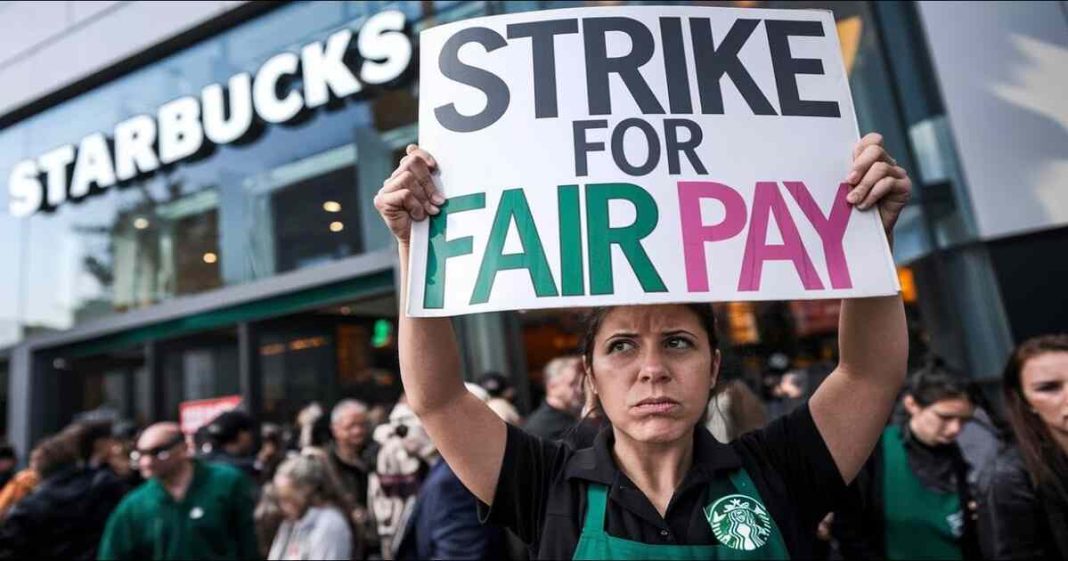Members of Starbucks Workers United have launched a five-day strike across multiple U.S. cities, citing unresolved grievances over wages, staffing levels, and work schedules. The strike began on Friday and initially closed stores in Los Angeles, Chicago, and Seattle, with plans to extend to Columbus, Denver, and Pittsburgh over the weekend.
The walkout marks the most extensive labor action taken by the union since its organizing campaign began in 2021, with the potential to involve “hundreds of stores” by Christmas Eve.
Workers Demand Better Pay and Conditions
Union members argue that their current wages, averaging $21 per hour, are insufficient in the face of rising inflation and the high cost of living in major urban centers. Many baristas report inconsistent scheduling and rarely receive 40-hour work weeks.
Read More: Vampire Diaries’ star earns praise after he rejects Starbucks onstage
“What might have been a great wage in 2013 is no longer adequate today,” said Shep Searl, a union member in Chicago. Searl joined other workers braving the snow and wind to picket outside a Starbucks store, receiving honks of support from passing drivers.
The union, representing employees at 525 stores across the U.S., has accused Starbucks of numerous unfair labor practices, including retaliatory firings, “captive-audience” meetings to discourage unionization, and punitive write-ups.
Negotiation Deadlock
Negotiations between Starbucks and Workers United began in April, following the establishment of a framework in February aimed at resolving outstanding legal disputes and crafting the first labor agreement. However, both parties accuse each other of stalling progress.
Starbucks claims to have participated in over nine bargaining sessions since April, reaching agreements on more than 30 topics, including some economic issues. Yet, the union contends that the company has failed to present a serious economic proposal, with less than two weeks left before the year-end contract deadline.
The company offered a 1.5% wage increase in future years but rejected the union’s demand for a 64% immediate raise and a 77% total increase over a three-year contract. Starbucks labeled these demands “unsustainable,” while the union criticized the company for prioritizing executive compensation over employee welfare.
Strike’s Growing Impact
Although Starbucks downplayed the strike’s effect, estimating only 10 stores out of 10,000 company-operated locations were unable to open on Friday, analysts believe the timing of the walkouts could amplify their impact.
“This is happening during one of the busiest times of the year for Starbucks, which could magnify the strike’s impact and draw unwanted scrutiny to the company’s labor practices,” said Rachel Wolff, an analyst with market researcher Emarketer.
The strike coincides with a broader wave of labor activism in the U.S., where workers across industries such as automotive, aerospace, and healthcare have secured significant concessions through organized actions.
Legal Challenges and Allegations
Starbucks faces mounting legal pressure as hundreds of complaints have been filed with the National Labor Relations Board (NLRB), accusing the company of unfair labor practices. In November, the NLRB ruled that Starbucks had violated the law by threatening workers at its flagship Seattle store with a loss of benefits if they unionized.
The union has also filed fresh charges, alleging the company engaged in bad-faith bargaining and refused to negotiate seriously over economic issues. Starbucks has denied these allegations, maintaining that it respects workers’ rights to unionize.
Executive Compensation Under Fire
Union representatives have criticized Starbucks’ executive compensation packages, particularly the multimillion-dollar stock grants awarded to CEO Brian Niccol, who joined the company in September. Niccol received 332,000 shares of Starbucks stock, valued at $29.5 million as of December, as part of his three-year contract.
“In a year when Starbucks invested so much in top executive talent, it has failed to present the baristas who make its company run with a viable economic proposal,” said Fatemeh Alhadjaboodi, a union delegate and five-year barista.
Test for Starbucks’ Future
Starbucks, which operates 11,200 company-owned stores in the U.S. and employs over 201,000 workers, has been undergoing a turnaround effort under Niccol’s leadership. His plans include restoring “coffee house culture,” simplifying menus, and overhauling cafes.
Read More: PayPal global outage disrupts services, impacts thousands
However, the ongoing labor dispute threatens to overshadow these efforts. The union has vowed to continue escalating the strike if no agreement is reached, adding pressure on Starbucks during the crucial holiday season. “We will do whatever it takes to show the company the consequences of not keeping their promises to baristas,” said Michelle Eisen, a longtime barista and union leader.














